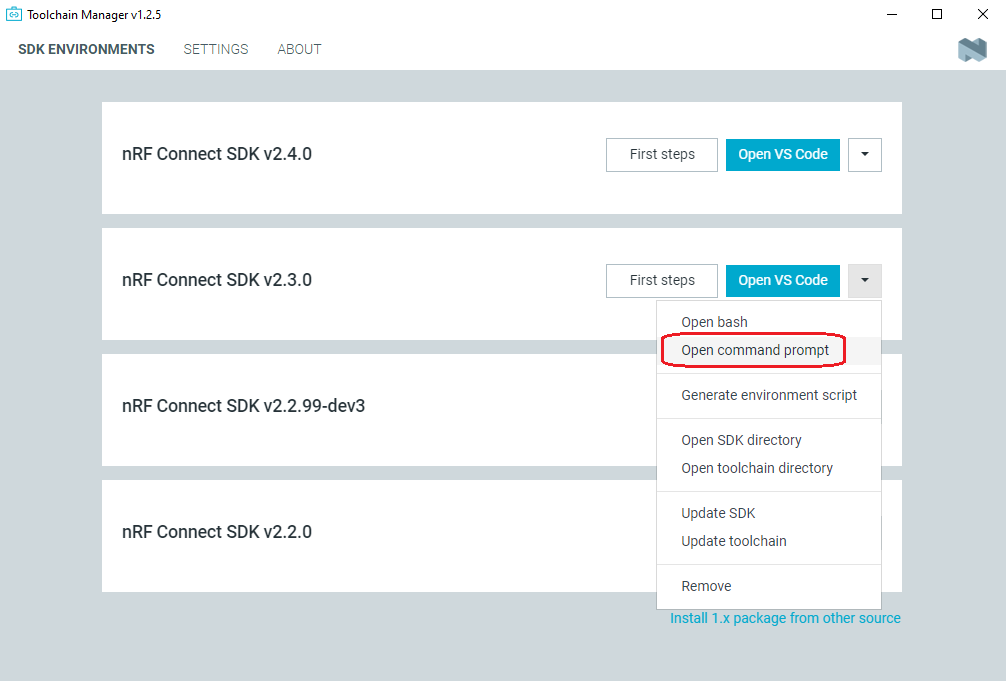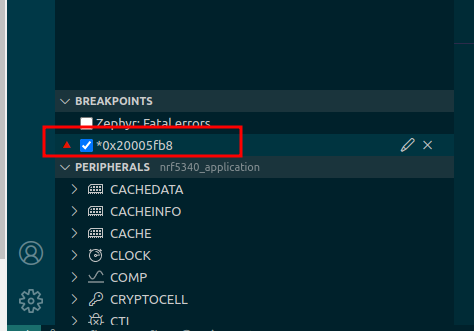I'm getting a bus fault from the following code when it hits spi_write_dt:
printk("Getting spi0\n");
spi_dev = DEVICE_DT_GET(DT_NODELABEL(spi0));
if( spi_dev == NULL ) {
printk("SPI not initialized.\n");
return SPI_NOT_INITIALIZED;
} else if( ! device_is_ready(spi_dev) ) {
printk("SPI not ready.\n");
return SPI_NOT_READY;
}
uint8_t spi_bytes[2] = {0};
struct spi_buf my_spi_buf[1]; // Buffer to hold one set of SPI data
my_spi_buf[0].buf = spi_bytes; // The byte array to send
my_spi_buf[0].len = 2; // Number of bytes in buffer
struct spi_buf_set tx_buff;
tx_buff.buffers = my_spi_buf;
tx_buff.count = 1;
return spi_write_dt(spi_dev,&tx_buff);
Here's the fault as reported to the UART:
Getting spi0 [00:00:23.264,434] <err> os: bus_fault: ***** BUS FAULT ***** [00:00:23.264,434] <err> os: bus_fault: Precise data bus error [00:00:23.264,465] <err> os: bus_fault: BFAR Address: 0x30303033 [00:00:23.264,465] <err> os: esf_dump: r0/a1: 0x000328ea r1/a2: 0x0002e00c r2/a3: 0x30303033 [00:00:23.264,495] <err> os: esf_dump: r3/a4: 0x00000000 r12/ip: 0x0000000c r14/lr: 0x00011a9f [00:00:23.264,495] <err> os: esf_dump: xpsr: 0x01000000 [00:00:23.264,526] <err> os: esf_dump: Faulting instruction address (r15/pc): 0x00011ac8 [00:00:23.264,556] <err> os: z_fatal_error: >>> ZEPHYR FATAL ERROR 0: CPU exception on CPU 0 [00:00:23.264,587] <err> os: z_fatal_error: Current thread: 0x20002088 (unknown) [00:00:23.368,530] <err> fatal_error: k_sys_fatal_error_handler: Resetting system *** Booting Zephyr OS build v3.2.99-ncs2 *** etc...
My overlay file sets the status to okay and sets a GPIO as a chip select:
&spi0 {
cs-gpios = <&gpio0 18 GPIO_ACTIVE_LOW>;
status = "okay";
};
My module is the Laird BL652 which gives me a dts file with this in it:
&spi0 {
compatible = "nordic,nrf-spi";
/* Cannot be used together with i2c0. */
/* status = "okay"; */
cs-gpios = <&gpio0 22 GPIO_ACTIVE_LOW>;
pinctrl-0 = <&spi0_default>;
pinctrl-1 = <&spi0_sleep>;
pinctrl-names = "default", "sleep";
};
My dev environment version is 2.30.
Any idea why I might be getting the bus fault?




